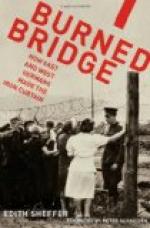He was, in a word, suffering an acute attack of loneliness.
That was why the empty space of the clearing affected him with a physical shrinking, why the neatly arranged interior of his cabin seemed hollow, abandoned, terribly dispiriting. He longed for the sound of a human voice, found himself listening for such a sound. The stillness was not like the stillness of a park, nor an empty street, nor any of the stillnesses he had ever experienced. It was not a kindly, restful stillness,—not to him. It was the hollow hush of huge spaces emptied of all life. Life was at his elbow almost but he could not make himself aware of that. The forested wilderness affected him much as a small child is affected by the dark. He was not afraid of this depressing sense of emptiness, but it troubled him.
Before nine o’clock in the forenoon had rolled around he set off with the express purpose of making himself acquainted with Sam Carr. Carr was a white man, a scholar, MacLeod had said. Passing over the other things MacLeod had mentioned for his benefit Thompson, in his dimly realized need of some mental stimulus, could not think of a white man and a scholar being aught but a special blessing in that primeval solitude. Thompson had run across that phrase in books—primeval solitude. He was just beginning to understand what it meant.
He set out upon his quest of Sam Carr with a good deal of unfounded hope. In his own world, beginning with the churchly leanings of the spinster aunts, through the successive steps of education and his ultimate training for the ministry as a profession, the theological note had been the note in which he reasoned and thought and felt. His environment had grounded him in the belief that all the world vibrated in unison with the theological harmonies. He had never had any doubts or equivocations. Faith was everything, and he had abundance of faith. As a matter of fact, until he encountered MacLeod, the factor of Fort Pachugan, he had never crossed swords with a man open and sincere in disbelief based on rational grounds. He had found those who evaded and some who were indifferent, many who compromised, never before a sweeping denial. He could not picture an atheist as other than a perverted monster, a moral degenerate, the personification of all evil. This was his conception of such as denied his God. Blasphemers. Foredoomed to hell. Yet he had found MacLeod hospitable, ready with kindly advice, occupying a position of trust in the service of a great company. Was it after all possible that the essence of Christianity might not be the exclusive possession of Christians?
Insensibly he had to modify certain sweeping convictions. He was not conscious of this inner compulsion when he concluded to try and meet Sam Carr without making theology an issue. Somehow this man Carr began to loom in the background of his thought as a commanding figure. At least, Thompson said to himself as he passed through the fringe of timber, Sam Carr by all accounts was a person to whom an educated man could speak in words of more than two syllables without meeting the blank stare of incomprehension.




